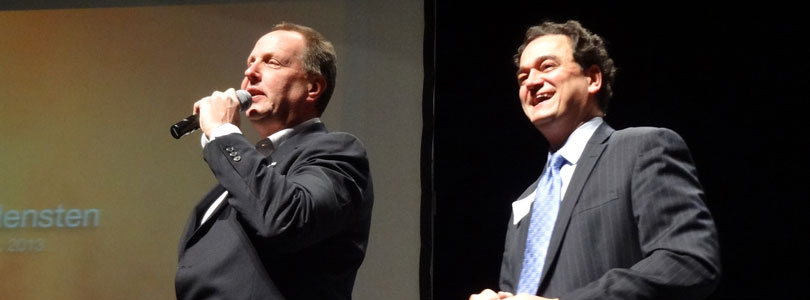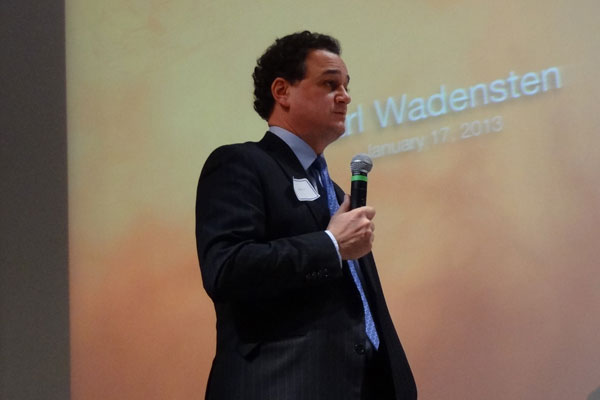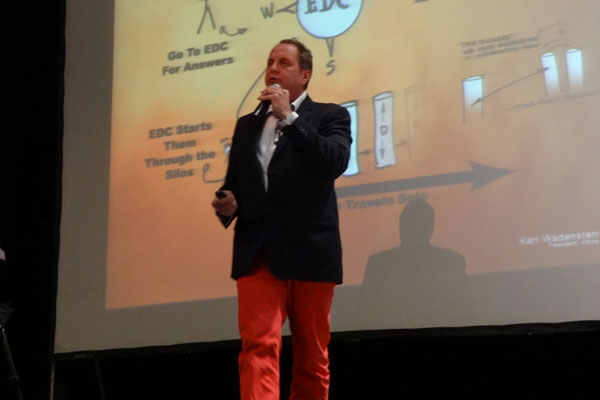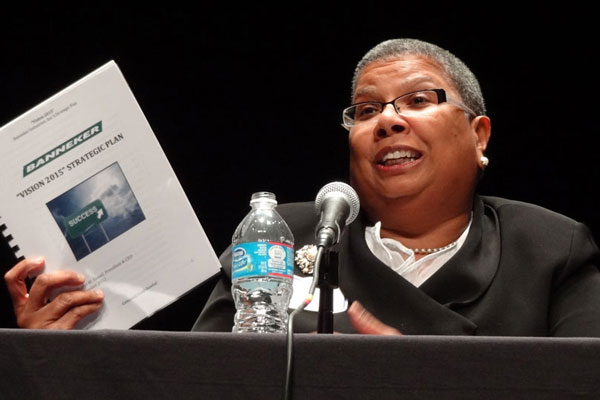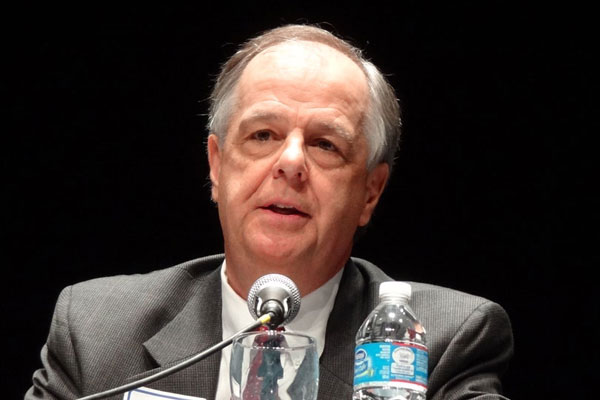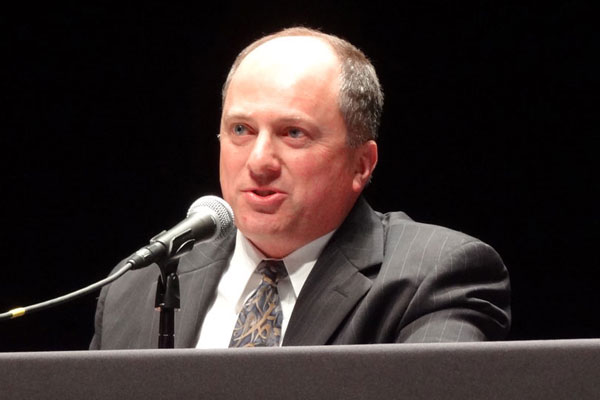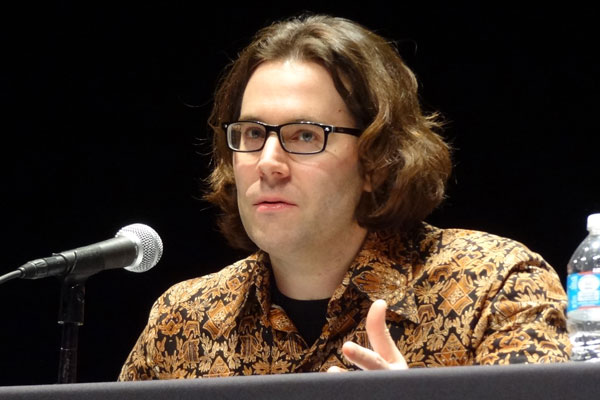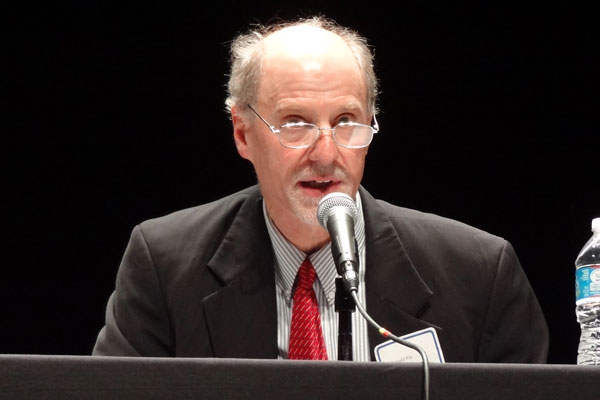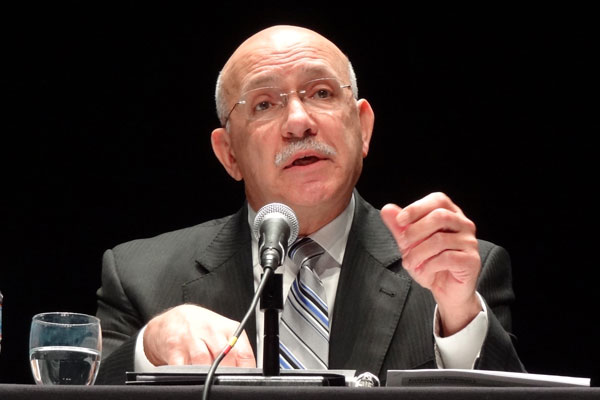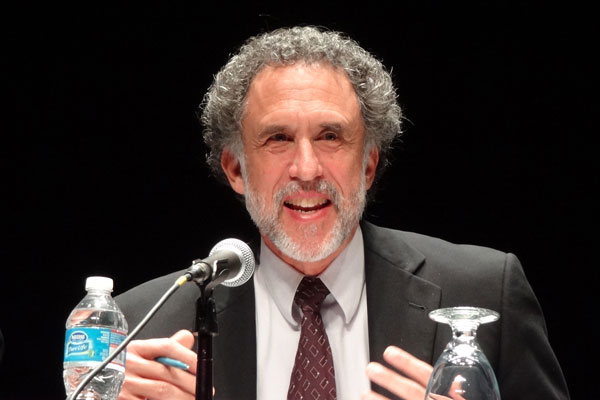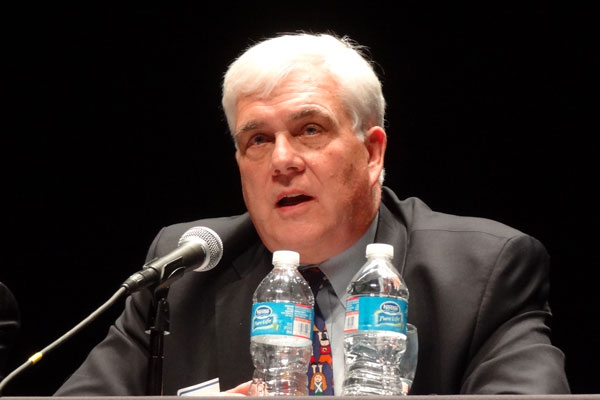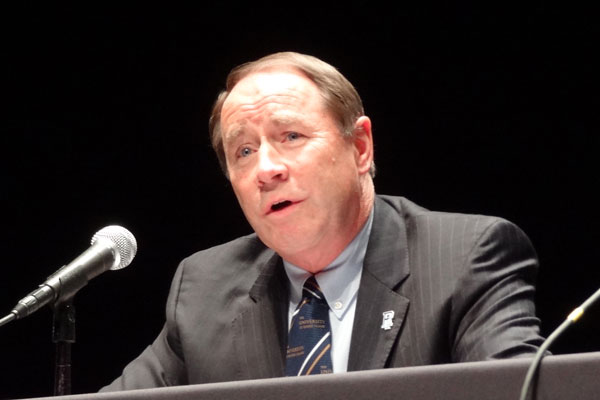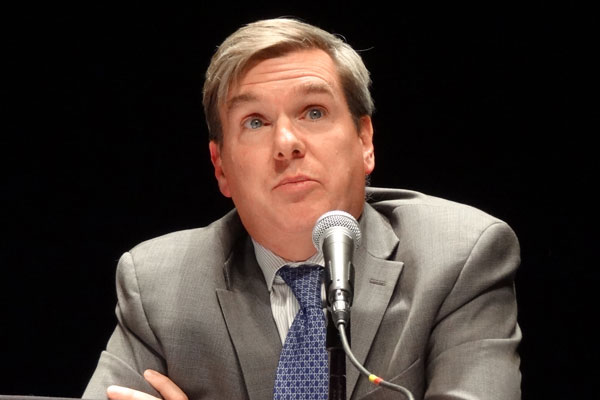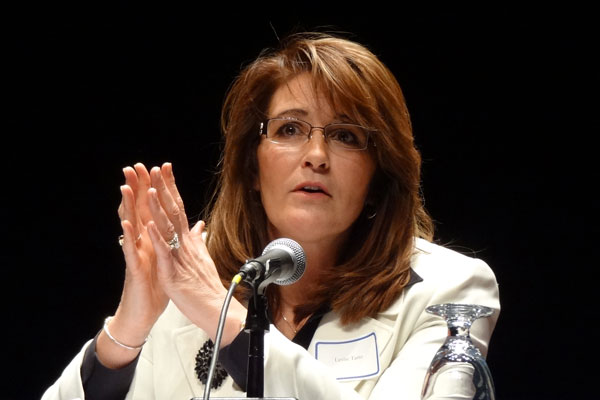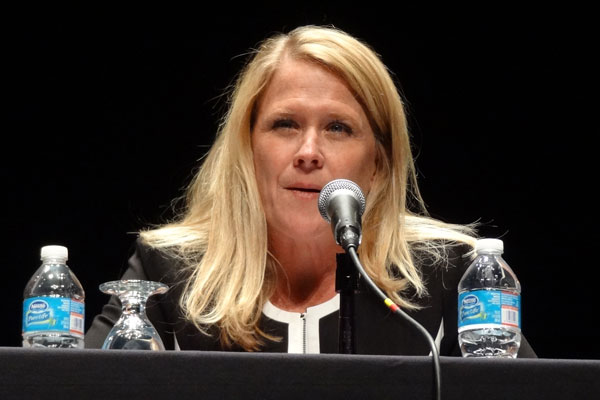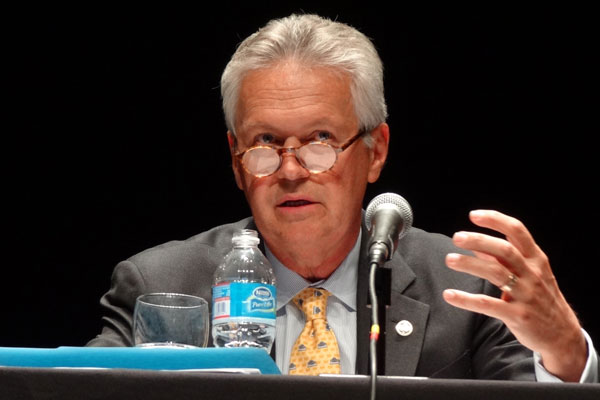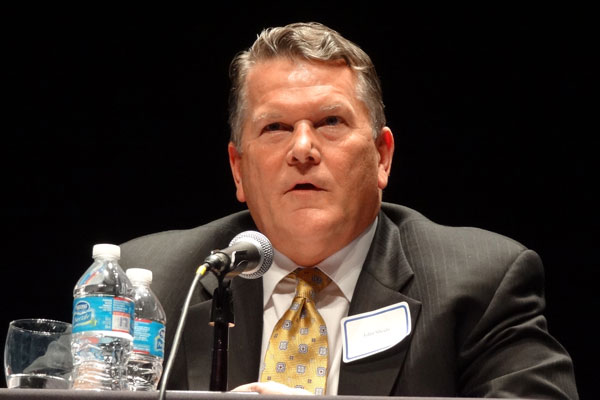01/17/13 – RI House Economic Conference
12:34 p.m.
There’s gotta be some kind of twelve-step program for folks who show up forty-five minutes early for a five-hour conference put on by members of the state legislature.
Sapinsley Hall in the Nazarian Center for Performing Arts at Rhode Island College is a great theater, though. I think I saw a Russian pianist play here a decade and a half ago, but I wasn’t very familiar with Northern Rhode Island, in those days, so I might be mistaken.
So far, aside from paid staff, only a few legislators and two of the planned panelists look eligible to join the recovery program with me.
1:01 p.m.
Around 40 legislators are here. Four media types, including me. They’re starting the program now.
1:04 p.m.
Speaker Gordon Fox (D, Providence) says that he thought that it would be good to do something productive while the legislators aren’t busy. He says the legislature is critical to economic development.
1:05 p.m.
While waiting, one of the other early birds (a panelist) commented to me that he’s surprised this is open to the press but not the public. I responded that they might have worried about seating, but looking behind me, any such concerns were mistaken.
Fox just said: “You can’t do sound research without doing the homework.” He says folks in business and labor have to do sound planning and research and so should a legislature.
1:08 p.m.
Fox says he’s trying to make the House a “legislator-driven legislature.” I imagine most Rhode Islanders thought that’s what they already had.
1:11 p.m.
Karl Wadensten, of Vibco, is up first and gets out from behind the table, displaying his bright-red slacks.
He called Speaker Fox back onto the stage and had the audience stand to chant, “Rhode Island Number 1!”
1:13 p.m.
Wadensten asks what’s getting in RI’s way. He quotes Ben Franklin, saying there are three things that are really hard: steel, a diamond, and knowing one’s self.
1:15 p.m.
Wadensten: “From what I know about your customers, the people of Rhode Island, they don’t want a plough-horse economy.”
1:18 p.m.
Wadensten asked the legislators to raise their hands if they would like to be customers of the services they provide. Hesitant elevation of hands, but a majority gradually were up.
1:19 p.m.
“In industry, we don’t look for fixes; we look for possibilities.” He doesn’t just want fixes.
Says RI is one of only five states with legislation creating an ORR (that’s Office of Regulatory Reform), yet we’re on the bottom of every list.
1:22 p.m.
Wadensten offers to work with legislators and urges them to take one step at a time copying what other states are doing right.
1:23 p.m.
Cheryl Snead, owner of Banneker Industries, is speaking; she held up her company’s 3-year strategic plan and is encouraging the legislators to follow the recommendation from the RI Public Expenditures Council (RIPEC), including a proposal for such planning.
1:25 p.m.
She says election cycles tend to limit themselves to two-year plans (i.e., to ensure reelection). She’s also on the EDC board, by the way, as is Wadensten.
1:26 p.m.
She’s citing the difficulty of a services economy’s not having infrastructure to use as collateral for capital borrowing. (Of course, I’d note, they need less start-up money if they don’t have to build structures and buy equipment.)
“It’s great to bring in outside funding, but you always hear, ‘What skin in the game are you going to put in?'” She means the state should put public money into businesses.
1:29 p.m.
Snead says her company has a close relationship with Bryant University (which, I’d note, took the lead on creating the economic development collaborative that saw the EDC giving partial funding for the universities’ activities).
1:32 p.m.
Snead invites the legislators to come observe Six Sigma “continuous improvement” in action in her company.
Within one of the six steps of the program, she says there are no bad ideas… living in Rhode Island, I’m not so sure about that.
1:35 p.m.
Gary Ezovski says he’s going to speak mainly in his capacity as chairman of the Regulations Subcommittee of the Annual RI Small Business Administration Economic Summit.
1:37 p.m.
“The engineer in me tells me that the friction” that keeps RI in the policy doldrums is just like traffic friction, using the example of “a dolt stuck in a catatonic state using his cell phone in the left lane” forcing everybody to break one of the fundamental rules of the road: keep right pass left.
1:42 p.m.
Ezovski offered ten specific regulatory priorities, both things that the government should not halt (e.g., regulatory review and reform) and a bunch of things that it should change, right down to loosening rules on the length of pay periods to let businesses operate themselves. On the other hand, he wants the state to impose more restrictions on what cities and towns can do with their own zoning and regulations.
1:45 p.m.
Ken Block, Moderate Party founder and gubernatorial candidate and owner of Simpatico Software Systems, says he’s got a stack of recommendations that he can’t possibly fit into ten minutes, but he invites anybody to sit down with him.
“Business is all about competition,” and he says RI is in competition with MA and CT. He says he’s talked to an economic official in Fall River, who told him his office is daily full of RI businesses looking for a comparison to what they’re experiencing.
He says legislators ought to consider every piece of legislation in light of what it would do to employment/unemployment.
Speaks against raising income tax because it disadvantages local businesses. “When you tax my net profitability at a rate that is twice as high as in MA,” it “directly impacts competitiveness.”
He says when we talk about raising taxes every single year, even if it doesn’t happen, that “projects instability.”
1:54 p.m.
Block shows a slide illustrating that unemployment insurance looks like some minority of companies are using it as part of their compensation structure. An example I’d offer would be a construction company that lays off its employees for the winter every year, relying on the insurance to supplement the pay it’s able to offer in the other seasons.
1:57 p.m.
Owen Johnson is the last speaker on this panel. He’s also the only one not in a dark suit jacket. Also the only one with hair past his ears, a fact that he utilizes for an opening joke.
Says of his company: “We don’t look at competing with the Silicon Valleys of the world; we compete with the Detroits of the world.” (Not sure what to make of that.)
2:01 p.m.
He says the number 1 thing business decision-makers are looking at is excellent education for their children, “and that’s very hard to find here in the public education system.” (I’d note that most of the people in the room probably heard that as a reason to devote more money to the system as it is, when they really should take it as a reason to allow more innovation and loosening their constrictive grip.)
2:04 p.m.
First question is to Johnson to ask whether he could apply his experience with Connect Providence to Rhode Island and work with the EDC. He explains that Connect Providence was really just a social gather, and the core of its success was the connection of people to other people.
2:06 p.m.
House Minority Leader Brian Newberry asks the two EDC board members what the legislators can do to make EDC work better. Snead says it goes back to planning, which is unfortunately tied to the governor (“unfortunately” because the actual person changes), but the legislature needs to be part of the plan, too.
2:09 p.m.
Wadensten says the EDC doesn’t even have a customer database. “EDC is just as much grassroots as it is high-tech financing.”
2:15 p.m.
A question from Rep. Lisa Baldelli-Hunt asked about using funds (including unemployment insurance) to help place people in jobs. A little discussion at the table about whether the companies they all operate are looking for people. Ken Block said his company is not; one of the other panelists asked if he would take them if he were getting them for free.
He said, “no,” because there are no real entry-level jobs in his line of work. I wonder how many companies are more like that, especially small ones, for which even bringing on free labor creates a lot of work for existing employees who don’t have time to manage them.
By the way, Snead just stated that the thought of an income-tax increase is “scary to me.” Her company is national, having set up facilities elsewhere to be closer to clients. Whenever she fills out paperwork for new locations, she is “deluged” with calls and other contacts from officials in those states trying to persuade her to move their headquarters there.
Businesses in RI “are being challenged every day with lucrative opportunities” to move out of state.
2:24 p.m.
Asked about problems at the EDC, Wadensten said that all of the various proposals that people tend to put forward are “Band Aids” unless more structural issue are addressed… Who’s the point person? Who are the customers? Etc.
Wadensten inadvertently called Gordon Fox “governor,” to a smattering of applause. “Don’t get me in trouble,” Fox joked.
2:26 p.m.
First panel ends. Four minute break.
2:29 p.m.
There are more media folks here than I realized. One Projo reporter (Alex Kuffner) appears to be leaving, but Jennifer Jordan is here for the next panel. WJAR’s Bill Rappleye has hopped on the stage to interview some of the exiting panelists. Steve Klamkin from WPRO left about 45 minutes in, but the AP’s David Klepper appears to be settled in for the long haul.
2:32 p.m.
The first panel was on “Small Business Challenges and Recommendations,” and now the second one, on “Workforce Development Gaps and Opportunities,” is beginning. First up is Ronald Pitt, RI College VIP for Academic Affairs, apparently filling in for RIC president Nancy Carriuolo. He’s giving a quick summary presentation about RIC.
One good line: “Contrary to popular opinion, artists really like money.”
2:40 p.m.
Pitt notes a few programs the college offers to help students with the challenges outside of the classroom that usually are the cause of their dropping out.
He highlights the fact that more young women than men attend college, and yet they don’t choose science, technology, engineering, and math (STEM) curricula, so there’s an “inadequate” representation of them there. He suggests (my words) social engineering, starting at early grades, to make girls as likely as boys to go into such areas.
2:44 p.m.
He positions the school’s arts programs as contributing to “quality of life,” which is very important, he says, to economic development.
2:45 p.m.
Ray DiPasquale, president of the Community College of Rhode Island, is now giving a summary presentation about his school.
2:46 p.m.
By the way, there are no exceptions to the dark-suit-jacket rule among the men now on stage, although Governor’s Workforce Board director Rick Brooks’s hair sticks out past his ears, and AFL-CIO boss George Nee has the liveliest tie.
2:49 p.m.
DiPasquale is describing some of the relationships that CCRI has with local businesses to provide training to their employees. He mentions the Tunstall deal that I pointed out here.
2:54 p.m.
He closes emphasizing the Governor’s Workforce Board’s thinking that internships are critical to economic development.
Now up is Rick Brooks, from that board. He’s describing what they do, noting that he represents the only organization on the stage that isn’t a household name.
2:57 p.m.
To be honest, I’m losing track of the many programs that the speakers are listing at top verbal speed. What I’m hearing is that the GWB has multiple multi-million-dollar programs using public money for workforce development purposes.
3:01 p.m.
Brooks says the bottom line is that Rhode Island just does not have enough jobs. If every current vacancy were filled with an unemployed Rhode Islander, there would still be about 50,000 too few.
He says the state is still 40,000 short of its peak employment, prior to the recession.
“Nonetheless,” he says, “many employers still report difficulty filling positions.” Top of the list of problems is a basic education and a basic understanding of professionalism (proper attire, punctuality, etc.). (I wonder how much of that is attributable to things like minimum wage laws that make it harder for teens and young adults to find jobs before they’re technically ready to enter the workforce.)
“Lastly, there’s not enough money,” Brooks said, with a chuckle.
3:06 p.m.
Nee is up. He says he’s been lobbying in RI since 1983, and he’s never seen a conference like this, that brought a whole chamber together.
Understandably, he’s speaking on the importance of having labor at the table as a third partner with government and the private sector. “We can be number 1. I think we will be number 1. And today might be the start of it.”
I’m hoping he addresses the business leaders’ objections to the tax increases for which he helps advocate.
3:08 p.m.
Nee emphasizes seeking policies that help the economic situation “today.” First example is the historic tax credit program, which he wants revivified, but with rules to make sure that the contractors are “reputable,” and that they be required to have apprentice programs.
He’s presenting the apprenticeship requirement as economic preparation for the future, but he doesn’t note that it’s also a way of creating barriers to entry for companies that would come in and compete with his union shops.
3:10 p.m.
Nee also likes the public colleges’ idea to take up land freed up by the I-Way project. He says a public-private cooperation would make that happen faster than a bond.
Other programs he likes are those that subsidize construction, public and private.
3:13 p.m.
Nee says Chafee’s budget, release last night, was “historic,” because it’s the first since 1991 that puts more money into job training. He also says kids don’t believe rhetoric about the importance of education when they attend classes in inadequate, technologically ancient buildings.
Yeah… if only there were a way to make a higher percentage of our education expenditures go to technology and infrastructure.
3:17 p.m.
University of Rhode Island President David Dooley says he’s going to highlight some successes that folks in the room are probably aware of.
He expands on the idea of the “skills gap” to talk about “the gap that exists frequently” between the colleges and universities and the communities in which they’re located. “One of the functions of a research university” is to address the lack of jobs by training employers. He cites Brown and URI as two excellent research universities in the state.
3:20 p.m.
He mentions that he’s already had “several conversations” with the new president of Brown to build on their relationship.
3:22 p.m.
Dooley says the institutions of higher learning are “magnets for talent,” and suggests that “we” have to create opportunities for them. As one of those sucked into Rhode Island through URI, I’d offer the suggestion that it would be more true to say that the state has to allow them to build their own opportunities
3:25 p.m.
One specific tool he lists is a Business Engagement Center, a “portal” to allow businesses, government agencies, and non-profits to find and access the work that’s already going on at the university.
3:26 p.m.
Rep. Jim McLaughlin asks Nee and Dooley if they feel that $2 million (per the governor’s budget) is “inadequate” for vocational training in the current budget.
3:37 p.m.
Dooley highlights the necessity of innovation for advancing the economy so that people have the resources to afford their own healthcare and other necessities.
3:40 p.m.
DiPasquale fields a question about the combined Board of Regents and Board of Governors for Higher Education saying that “we’re embracing it,” because the board will be more harmonious in ensuring that public schools prepare students for college.
“Right now as we sit here, we do not have a Board of Education or a Board of Governors.”
3:50 p.m.
Panel 3 is on “Local/Regional Experiences, Successes and Solutions.” Projo’s Phil Marcelo takes the torch for that publication.
Meanwhile, Wadensten has positioned an unlit cigar between his lips in the audience. Me, I’m still working on the same piece of gum I’ve had since I got here.
3:54 p.m.
Gregory Bialecki, MA Secretary of Housing and Economic Development, says he’s not going to offer suggestions to Rhode Island, but just give a view into MA’s activities.
He refutes the notion that the New England states are competitors, but rather, he says they’re all competing with regions around the world.
3:56 p.m.
Bialecki says his state focuses on long-term planning, competing nationally, emphasizing existing strengths, and (if I may insert the central planners’ lingo) equitable economic development that helps all people in the state equally.
It’s interesting to note that he listed Massachusetts’ strengths as technology and innovation, thereafter offering that Rhode Island has strengths in marine industries and tourism. Somebody who sees the states as in competition might have taken that as a subtle suggestion that Massachusetts has ownership of the exact areas that Rhode Island leaders have stated an interest in pursuing.
4:01 p.m.
“It’s not an accident that Massachusetts has recovered more quickly than the rest of the nation.” I’d note that that’s a little bit of a different attitude from those in Rhode Island who think our state will recover when the national economy recovers… we’re always first into recession and last out.
4:02 p.m.
Catherine Smith, Commissioner of the Connecticut Department of Economic and Community Development, is describing an every-corner search of her state with the governor for information about helping businesses. Once again, we hear the term “strategic plan.”
(A theme is emerging there, and I expect it’s going to be an organizing principle of the policies that receive the “economic development” stamp in the State House this year. I’m not so sure that governments should be doing things that require “strategic plans.” Where does that leave the right of the people to shift direction every few years in elections?)
4:06 p.m.
This panel is the most fashionably diverse, by the way. Even Mr. Bialecki’s suit is lighter than the others that we’ve seen, and I think Smith’s suit jacket might be a perfect match with Wadensten’s pants.
4:13 p.m.
Smith credits two programs (sorry, I was distracted) with helping CT pull out of a recession that was, she said, worse than in Massachusetts. Actually, in terms of employment, Connecticut was doing much better than either of its New England neighbors, but it’s been in free fall in recent months. I wonder if these programs are to credit for that.
4:14 p.m.
RI Director of Regulatory Reform, Leslie Taito, says she’s going to “channel” Wadensten, because she wants the audience to become “souped” about regulatory review. (“Souped?” Did I hear that right? Where’s that from?)
She says everybody in RI is on the same page about a “clear, predictable, and reliable” regulatory system.
4:18 p.m.
Taito’s running through her description of what she does. I didn’t catch the specific numbers, but she said almost the same thing on the December 20 Positively Rhode Island show, if anybody wants to download the podcast. The upshot is that Rhode Island has a lot of regulatory government agencies and a whole lot of overlapping regulations.
4:24 p.m.
Interesting catch phrase from Taito, describing getting businesses “unstuck” from the regulatory system: If they’re not going to be successful in getting through the system, she wants them to “fail fast and fail cheap.”
4:25 p.m.
Responding to a question from Rep. O’Grady, Bialecki mentions Governor Patrick’s speech last night, proposing a major tax overhaul that would increase income taxes and decrease sales taxes “in a way that increases revenue.”
(Keep in mind, though, that he doesn’t see Massachusetts as a competitor to the states around it.)
4:32 p.m.
Smith is answering a question about the involvement of the legislature in CT’s economic development, saying she misspoke if she gave all of the credit to the executive branch, before. I missed some of her answer, though, because I was having a daydream in which at least one legislator knew enough about regional employment trends to challenge her on the effectiveness of an economic development regime in a state that’s been losing employment at a frightening pace.
4:35 p.m.
Smith said that traveling the state, she did get the sense that all businesses want government to be smaller, and that states are competing in that regard.
Rep. Frank Ferri notes that he attended a meeting with business leaders and Taito, and he’s never seen business folks open up so much to government officials, because they were so jazzed (my word) that the state might be doing something right.
But Ferri then went on to ask Bialecki about the possibility of a “Regional Economic Policy Council” that would involve governments in multiple states’ setting plans and pulling the strings for the regional economy. That doesn’t sound like competing for smaller government to me.
4:42 p.m.
Wadensten took a microphone to say that Taito has a four-star rating among all of the businesses he knows, and he’s asking the legislators “to support Leslie.”
4:45 p.m.
Important note: as we take a brief break before the next panel: the chemical bonds of my chewing gum finally gave out, and it became mush. I note the detail here so I’ll have evidence to describe when I find that 12-step program.
I’d also throw in a word of thanks for the magic of hard-drive camcorders. Still recording away, with no need to change a tape or a card. Think of that: technology for recording data-intensive video outlasts a simple piece of gum. (Of course, if I were chewing on my camera, that might make a difference.)
4:50 p.m.
Now on to the “Rebranding” panel.
4:53 p.m.
Martha Sheridan is president and CEO of the Providence Warwick Convention and Visitors Bureau. She says her work is no longer about developing a slogan and buying ads, because of all the competition “from the states to the north and south” and any city that has a convention center is fighting for events.
She says RI saw a 10% increase in hotel revenue, last year. The thing that’s missing is “a brand” to provide a “what does it mean” for people to visit RI, move here, start businesses here.
She cites a campaign in Michigan, although (again) I’m not sure how that comports with the reality that Michigan is the only state worse off than Rhode Island when it comes to recovering jobs lost in the Great Recession.
4:57 p.m.
Sheridan makes the most interesting point that I think I’ve heard all day: When her organization brings people in to preview Rhode Island, they always love it and see all of the state’s advantages, but they invariably express surprise that the people who live here don’t seem to see it.
Speaking for the Rhode Islanders I live among, I wonder how much of that is a problem of not having the time or resources to enjoy the state because they’re struggling to get by or figuring out how to move. That wouldn’t be a branding issue.
5:04 p.m.
John Bowen, Chancellor of Johnson & Wales University, opened with a story of two shoe salesmen who were sent to sell in Africa. One called back to the home office and said, “There’s no market here. All I see are people running around barefoot.” The second called back and said, “Send me shoes in every size. There’s a wide open market here.” He says that’s like Rhode Island.
He wants everybody to be positive and to stop complaining and start hiring and making people get to work. He’s tired of seeing elected officials going out and making great, positive announcements, and then the first three questions from the reporters are negative. (Sure does know his audience.)
Bowen also offered, if Leslie Taito has an empty office, that Johnson & Wales will find and pay interns to work with her.
5:10 p.m.
Bowen also wants his university to be like a venture capitalist, offering seed money for businesses.
5:16 p.m.
John Sheets of Boston Scientific Corp. says RI should be the Palo Alto of the East. He also told the story of police dragging four suspicious guys out of a white van outside of a shopping mall, and it turned out that they were from Toyota, doing research about how shoppers open their trunks with their hands full. Ultimately, that’s what led to remote openers.
The point, I guess, is similar to Wadensten’s “know your customers” admonition.
He also talked about the habit of Steve Jobs to call his employees with ideas at 3:00 a.m. Not sure what the point of that was, although it might be interesting for the owners of Rhode Island (i.e., the people) to be able to call the governor at that time.
5:23 p.m.
Neil Steinberg, head of the RI Foundation, joked that it’s tough to be the last person on the last panel. He listed many of the monetary contributions RI Foundation is putting into the recent economic development push, including $50,000 to Leslie Taito’s office for an e-permitting initiative.
5:25 p.m.
He says Rhode Islanders need to be sold on an “internal pride,” in the way the biggest obstacle to the old “I Love NY” slogan was public opinion of actual New Yorkers. He’s got a lot of examples. One was that you go to a Patriots game, spend $12 on a hotdog and $6 on a bottled water, grumble, and then sit down and say how great it is to be at the game. Point being that Rhode Islanders should have that attitude.
Steinberg thinks the top elected officials should get together, pick 10 big things to get done, and do them.
He goes on, “It is inconceivable to me that we do not have a War on Unemployment.” He can’t understand how people aren’t “appalled and agonized” about the 58,000 people who are unemployed.
“I’ve never seen us miss a recession; we have missed upturns.”
Three goals: Unemployment must be the national average, raise median household income to the level of Massachusetts and Connecticut (“Massachusetts ain’t as great as it thinks it is”), and closing income, education, and employment gaps that exist across diverse cross-sections of Rhode Islanders.
5:33 p.m.
Rep. Deb Ruggerio asked about combining all of the funds that regional marketing entities spend, but Sheridan said it’s not a good idea, because each target audience is so distinct and unique.
“I really, to the core, don’t think that it’s work that a single statewide entity could do.” (Wise observation that, I’d argue, applies to many more aspects of Rhode Island than tourism marketing.)
5:34 p.m.
As we move into the Q&A, I want to mention that Steinberg’s enthusiasm is definitely contagious, but I think there are two fatal problems to it. The first is that (again) for many Rhode Islanders, the state is a different place than it is for legislators, lawyers, and organizational executive directors, one where it’s extremely difficult just to get by.
Here’s an example: I wanted to go to a really intriguing woodwind concert at an antique building in Tiverton a week or two ago, but looking at $25 per ticket for adults and $10 for children, well, when taxes and fees and tolls and regulations and subsidies for green energy in my electric bills take such a huge bite out of disposable income (not to mention the employer’s market that high unemployment creates), $80 for an hour or two of entertainment, however valuable it might be for the kids, is hard to justify.
The question is: Quality of life for whom?
The second fatal problem is that a “pick 10 things and just do them” suggestion assumes that the answer is obvious and that the objections aren’t sincerely held, just needing some easing of unnecessary friction. I’d put eliminating the sales tax high on that list of things to “just do.” How many of the legislators in the room would accept that?
5:45 p.m.
And on that note, Rep. Pat Serpa stood up to issue a call to “journalists and radio hosts and wonderful bloggers” to stop being so negative and to partner with them to turn the state around, presumably through positive branding. (I’m kinda new to this, but I’m pretty sure that’s contrary to the design of a necessarily aggressive media challenging the powers who be.)
5:47 p.m.
Fox closes, saying that they could have spent five hours with each of the panelists. He’s going to ask certain representatives to take ownership of certain aspects of economic development.
He notes that they have all of the representatives’ budget books, for those “who just can’t wait to delve into them.”

